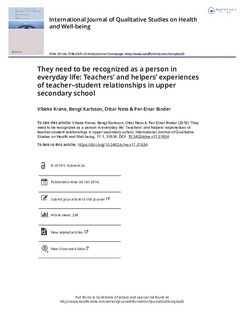They need to be recognized as a person in everyday life: Teachers' and helpers' experiences of teacher-student relationships in upper secondary school
Journal article, Peer reviewed
Published version
Permanent lenke
http://hdl.handle.net/11250/2486647Utgivelsesdato
2016Metadata
Vis full innførselSamlinger
Originalversjon
International Journal of Qualitative Studies on Health and Well-being. 2016, 11 . 10.3402/qhw.v11.31634Sammendrag
The aim of this study was to explore how teachers and helpers experience that teacher–student relationship (TSR) is developed and promoted in upper secondary school. We also explored their experiences of qualities of TSR with students with mental health problems or at risk of dropping out. The study used a qualitative and participative approach; key stakeholders were included as co-researchers. Focus group interviews were held with 27 teachers and helpers. A thematic analysis was conducted. The participants’ descriptions of important experiential dimensions of TSR were clustered around four themes: (1) to be recognized as a person with strengths and challenges in everyday life, (2) collaborative relationships between students and teachers, (3) flexible boundaries in the relationship between teachers and students and (4) organization of classes and procedures set the stage for TSR. Collaborative, emotional and contextual qualities were found important to the development of TSR in upper secondary school. Experiences of negative qualities of TSR can contribute to push students out of school. Teachers and helpers experience that TSR may have the potential to play a role in promoting mental health in students’ everyday life.

